
The faculty voted to approve a Native American and Indigenous Studies (NAIS) coordinate program for the 2025-26 academic year at the May 8 faculty meeting. The program will be made up of courses across departments including American studies, anthropology, Arabic studies, biology, and history. The proposal passed with a vote of 74–9, with 11 faculty members abstaining.
Coordinate programs are groups of related courses that are listed in the course catalog for informational purposes, but do not culminate in a credential, like majors and concentrations. Instead, they are intended to highlight courses across departments and serve as a guide for interdisciplinary study.
Professor of Geosciences José Constantine, who co-wrote the proposal for the program with Professor and Chair of Arabic Studies Amal Eqeiq, will serve as the program’s faculty coordinator. “[The program] offers coherence, visibility, and recognition,” he wrote in an email to the Record. “Students can now pursue a defined path of study in Native American and Indigenous Studies, and faculty can more easily coordinate curriculum and mentoring.”
“While the teaching of classes won’t immediately change, we hope the program will lead to new course development, support faculty-student research, and deepen community-engaged learning opportunities,” he added.
“This program reflects Williams’ long-standing commitment to rigorous interdisciplinary inquiry and aligns with our responsibility to engage meaningfully with the history and present realities of the Stockbridge-Munsee Community, whose ancestral and contemporary homelands include Williamstown, as well as histories of other Indigenous people globally who also underwent and are undergoing similar processes for centuries,” the report reads.
Constantine and Eqeiq wrote in a joint statement to the Record that forming the program has been a long-term effort. For the last four years, they said, they have worked alongside a group of faculty from multiple departments, as well as students and staff from the Davis Center and the Office of Institutional Diversity, Equity, and Inclusion.
The program follows several years of advocacy from students and faculty at the College, Constantine said. Much of the advocacy, including a petition that the College’s Native American Indigenous Student Alliance (NISA) submitted to President Maud S. Mandel last fall, has involved demands for the establishment of an Indigenous studies major at the College.
Daisy Rosalez ’25.5, NISA’s chair, emphasized that a department, rather than coordinate program, is the long-term goal of the group’s advocacy. “Why not invest our energies and efforts in that long term future now?” she wrote in an email to the Record. “Williams shouldn’t be building things ‘brick by brick’ to see where they go. Williams should begin with the whole building in mind and bring in experienced architects (Native American Indigenous Academics/Consultants) to help guide and support the creation of a NAIS Department.”
Constantine wrote that implementing a coordinate program promotes interdisciplinary study and reduces the administrative burden while preserving the option to turn the program into a major. “We pursued a coordinate program rather than a new major to encourage students to bring Indigenous frameworks into other fields of study, such as Anthropology, Biology, History, Geosciences, and beyond,” he wrote. “The coordinate structure provides a lower administrative lift than a major or concentration, allowing us to build curricular coherence and visibility without requiring a formal chair. If interest from students and faculty continues to grow, the program could evolve into something that eventually leads to a concentration or major.”
Constantine and Eqeiq initially proposed the coordinate program to the Committee on Educational Affairs (CEA) on Feb. 27. The CEA then reviewed the proposal and provided feedback, which Constantine and Eqeiq used to finalize the proposal.
According to CEA Chair Sara Dubow, the CEA evaluates potential coordinate programs based upon three criteria. “Coordinate programs need to have an interdisciplinary rationale, a set of courses that will be regularly offered from a range of units, and a designated faculty member who will be responsible for administering the program and coordinating with the Registrar’s Office to ensure that the catalog includes an updated list of courses every year,” she wrote in an email to the Record.
Constantine said the CEA’s feedback included suggestions to clarify the program’s governance and strengthen the advisory role of its steering committee. The faculty advisory board outlined in the final proposal consists of ten faculty members, all of whom also served on the working group. The board is responsible for overseeing the inclusion of courses, developing additional programming, and facilitating collaboration with the Stockbridge-Munsee Community.
Constantine and Eqeiq sent their final proposal to the CEA on April 18, at which point the committee voted to approve the proposal and bring it to the faculty for a full vote.
Constantine wrote that he will begin working with the Registrar’s Office to update the 2025-26 course catalog and is planning a roundtable event for next fall to celebrate the program’s launch. “We see this as just the beginning,” he wrote. “Our goal is not only to support scholarship in Indigenous Studies, but also to ensure that Williams is a welcoming place for all students interested in this field and a thoughtful institutional partner to Indigenous communities.”














